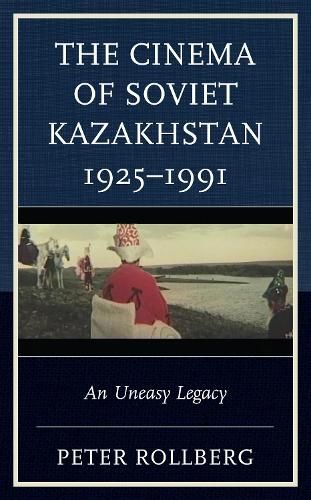
The Cinema of Soviet Kazakhstan 19251991: An Uneasy Legacy
(Hardback)
Available Formats
Publishing Details
The Cinema of Soviet Kazakhstan 19251991: An Uneasy Legacy
By (Author) Peter Rollberg
Bloomsbury Publishing PLC
Lexington Books
12th February 2021
United States
Classifications
Professional and Scholarly
Non Fiction
Digital, video and new media arts
General and world history
791.43095845
Physical Properties
Hardback
466
Width 162mm, Height 239mm, Spine 33mm
848g
Description
This monograph traces the history of Kazakh filmmaking from its conception as a Soviet cultural construction project to its peak as fully-fledged national cinema to its eventual re-imagining as an art-house phenomenon. The authors analysis places leading directorsShaken Aimanov, Abdulla Karsakbaev, Sultan-Akhmet Khodzhikov, Mazhit Begalinin their sociopolitical and cultural context.
Reviews
Peter Rollberg's book fills a double gap. To his meticulous analysis of a filmography that is too-little known, he adds an enlightening look at the singular relationships maintained by this republic, a strategic bridge between Russia and Central Asia, throughout the history of the USSR. By observing the development of the seventh art in a concrete peripheral republic, this book enriches our knowledge of the relationship between center and periphery and allows us to better understand how national identities were forged within the Soviet ideological system.
--Jean Radvanyi, professor emeritus, National Institute for Oriental Languages and CivilizationsPeter Rollberg's history of Kazakh cinema, covering the period from its emergence in the 1920s to the country's independence the 1990s, is not only the first comprehensive account of film art in Soviet Kazakhstan, but also a truly monumental and detailed survey of the stories on and behind the silver screen, the studio's relationship with the center, and the appeal of various narratives to the audiences at home and across the Soviet land. Rollberg pays attention not only to the well-known names and films, but also to lesser-known topics such as children's and youth films, professional training, and the peculiar role of Alma-Ata during WWII, when the country's major studios and filmmakers were evacuated there. This book will make a fabulous companion and reference guide to Soviet Kazakh cinema.
--Birgit Beumers, Aberystwyth University, editor, Studies in Russian and Soviet CinemaThis comprehensive and original work is certainly the most important study on Kazakh cinema in the English language. Drawing on deep personal interest and utilizing a sociopolitical lens, Rollberg examines themes of national identity and memory, aesthetics and artistic creation, and the role of viewers in shaping the history of Kazakh film. Rollberg masterfully explicates Kazakhstan's complicated relationship with Moscow, highlights Central Asia's unique contributions to film history, and re-affirms Shaken Aimanov as the hero of Kazakh cinema.
--Michael Rouland, Georgetown UniversityTHE SOVIET ERA OF KAZAKH FILMMAKING HAS BEEN POORLY studied to date, with no volume covering the entire period. Kazakhstani cinephiles will welcome Peter Rollberg's volume, which reveals the complex, rich and distinct world of cinema that developed in Kazakhstan throughout the Soviet era.... Rollberg's book is an impressive achievement and stands out as a key text not just on Soviet cinema in Kazakhstan but on Soviet film studies more generally.
-- "Europe-Asia Studies"Author Bio
Peter Rollberg is professor of Slavic Languages, film studies, and international affairs at George Washington University.
